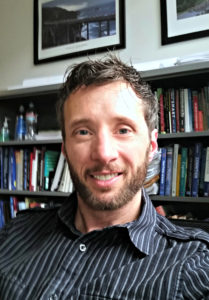Read over your notes again and again. Review the class material. Repetition, repetition, repetition. These study tactics have been drilled into us for years.
But science says we’ve been doing it wrong.

In the Department of Psychology at Colorado State University, faculty have been studying how our brains actually learn best. And Associate Professor Ed DeLosh has some potentially surprising news: Forget all of that old-school reviewing. There’s a new school of thought about learning and memory.
Don’t repeat after me
Pop quiz: How would you most effectively memorize a set of 10 new terms or definitions? Answer: Probably not the way you think.
“What people think works for learning and memory and what science tells us works for learning and memory don’t match up,” DeLosh said. In fact, psychology, and science in general, consistently remind us that “we can’t rely on our intuition and beliefs – because they’re often wrong,” he said. “What we need to do instead is turn to what research tells us.”
One of the biggest learning misconceptions, he said, is the value of repetition. It is a classic tactic, perpetuated by movies, the media, and probably even by our parents. But, DeLosh said, “It might be the worst compared to a variety of strategies you might use.”
Another surprise from science is that sticking to information presented in your “learning style” (visual, aural, verbal, physical, etc.) does not seem to help. In fact, research suggests that “what people prefer or what feels easiest may not be best – and struggling during learning actually has benefits for long-term learning,” DeLosh said. So what works better is to expose yourself to a variety of “styles” of learning a concept. “It gets people to look at the material from different perspectives,” DeLosh said. And that makes it stick better in the brain.
Learning to learn
All of this compelling research – and persistent misconceptions – prompted DeLosh and his colleagues to launch Psychology 152: Science of Learning. The course is open to all undergraduates and fulfills the All-University Core Curriculum requirement for social and behavioral sciences. “We see this course as valuable for the whole community,” DeLosh said. The goal is “to inform students about how their intuition and beliefs about learning and memory are often incorrect – and then to provide them with the strategies that the science of learning and memory tell us do work.”
The class doesn’t just teach the science behind this smarter studying, but it also demonstrates it. To debunk the stubborn myth of repetition’s efficacy, for example, students try a learning task, testing repetition against another strategy. The result? Repetition gets the lower marks. “They end up being quite surprised that what they’ve been doing isn’t the best way of doing things,” DeLosh said of the students.
The goal of PSY 152, of course, extends far beyond students’ success in this particular class. “We want to arm students with good study habits and good study techniques that they can apply to the rest of their course work,” he said. Current sections of the class are capped at 50 students, but beginning fall 2017, the course will also be offered online in hopes of reaching a broader audience.
Get quizzed
So if everything we thought we knew about studying is wrong, what does science say we can do to learn better? Get quizzed.
“We usually think of quizzes and tests as a way to evaluate how much students have already learned,” DeLosh said. But his research and that of others shows that quizzing is actually among the best ways to prime the brain to remember the material in the future.
“The act of taking a test, the mental processes involved in trying to retrieve information, that actually solidifies that information in memory,” DeLosh said. So “teachers would be good to start to think about quizzes and tests not just as tools for evaluation but also as tools for learning.”
Yes, this means DeLosh gives a lot of quizzes. “In my own classes, students take a quiz every week online.” But these aren’t meant to put the pressure on grade-wise. In fact, the quizzes are open-book, open-note, and every student aces each quiz: “I select 10 concepts I expect every student to have mastered from that week’s material,” DeLosh explained. “They have to demonstrate that they have mastered all 10 concepts” – by retaking variations of the quiz until they get each concept down. And a perfect score on the quiz.
Despite some groans on the first day of class, DeLosh said students report at the end of the semester that they liked the quizzing method and wished other classes used it, too. The quizzes also mean students are spacing their studying throughout the semester – rather than cramming right before the exams.
But because this is science, DeLosh wanted to know, “Do students actually do better?” he asked. They do, it turns out. Changing nothing else beyond adding practice quizzes into a course, students can see an average of a full letter grade improvement on exams, according to research.
4 study tips, from science:
1. Don’t: Spend much time on simple repetition and simple rereading. Instead, DeLosh said, use that time to do the following three things:
2. Do: Engage in practice testing. Even if your instructor doesn’t offer regular quizzes, you can hold informal quiz sessions with classmates and friends. Or quiz yourself with flashcards.
3. Do: Use “elaborative learning” – think deeply about what you’re learning. Form meaningful connections between the new things you’re learning and what you already know, other things you’re learning, concrete examples, and everyday experiences.
4. Do: Space out your studies. More studying is generally better, DeLosh said, but if you only have, say, three hours to study for a particular exam, you will do better to study one hour a day for three days – rather than three hours the night before.